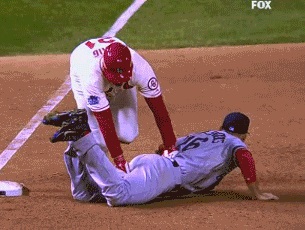One of the most controversial calls in recent memory gave the St. Louis Cardinals a 5-4 win over the Boston Red Sox in Game 3 of the World Series on Saturday night. Umpire Jim Joyce, who notoriously screwed up Armando Galarraga’s perfect game, called obstruction on Red Sox third baseman Will Middlebrooks for impeding the path of Allen Craig, who was trying to score following an overthrow by catcher Jarrod Saltalamacchia on a fielder’s choice with one out in the ninth.
Even though Craig was thrown out at the plate for what would have been the last out of the inning, Joyce called obstruction, which gave Craig and the Cardinals the winning run.
Here’s a clear look at the play:


There is no doubt that was the correct call. Intent is immaterial on the play; as long as obstruction occurs, it’s up to the umpire to make the call and use their judgment to determine where the runner would have been.
For better understanding, here is how obstruction is defined by MLB:
OBSTRUCTION is the act of a fielder who, while not in possession of the ball and not in the act of fielding the ball, impedes the progress of any runner.
Rule 2.00 (Obstruction) Comment: If a fielder is about to receive a thrown ball and if the ball is in flight directly toward and near enough to the fielder so he must occupy his position to receive the ball he may be considered “in the act of fielding a ball.” It is entirely up to the judgment of the umpire as to whether a fielder is in the act of fielding a ball. After a fielder has made an attempt to field a ball and missed, he can no longer be in the “act of fielding” the ball. For example: If an infielder dives at a ground ball and the ball passes him and he continues to lie on the ground and delays the progress of the runner, he very likely has obstructed the runner.
Read that last line and tell me that what happened isn’t the definition of obstruction.
Also, even though intent is not part of the rule, I have no doubt that Middlebrooks kicked his legs up on purpose. He knew that Craig was going to score the wining run after the overthrow and tried to slyly impede him by tripping him.
Tell me why he had his feet up this high if he wasn’t trying to impede Craig:

Here’s the full language of the rule on obstruction:
When obstruction occurs, the umpire shall call or signal “Obstruction.”
If a play is being made on the obstructed runner, or if the batterrunner is obstructed before he touches first base, the ball is dead and all runners shall advance, without liability to be put out, to the bases they would have reached, in the umpire’s judgment, if there had been no obstruction. The obstructed runner shall be awarded at least one base beyond the base he had last legally touched before the obstruction. Any preceding runners, forced to advance by the award of bases as the penalty for obstruction, shall advance without liability to be put out.Rule 7.06(a) Comment: When a play is being made on an obstructed runner, the umpire shall signal obstruction in the same manner that he calls “Time,” with both hands overhead. The ball is immediately dead when this signal is given; however, should a thrown ball be in flight before the obstruction is called by the umpire, the runners are to be awarded such bases on wild throws as they would have been awarded had not obstruction occurred. On a play where a runner was trapped between second and third and obstructed by the third baseman going into third base while the throw is in flight from the shortstop, if such throw goes into the dugout the obstructed runner is to be awarded home base. Any other runners on base in this situation would also be awarded two bases from the base they last legally touched before obstruction was called.
(b) If no play is being made on the obstructed runner, the play shall proceed until no further action is possible. The umpire shall then call “Time” and impose such penalties, if any, as in his judgment will nullify the act of obstruction.
Rule 7.06(b) Comment: Under 7.06(b) when the ball is not dead on obstruction and an obstructed runner advances beyond the base which, in the umpire’s judgment, he would have been awarded because of being obstructed, he does so at his own peril and may be tagged out. This is a judgment call.
There’s no denying that Joyce made the right call. The problem is people don’t like having outcomes of events overturned by an umpire’s decision.
GIFs via GIFD Sports

